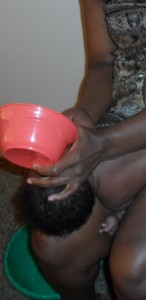Ni ayé àtijọ́, kò si itẹdi à lò sọnù bi ti ayé òde òni. Bẹni wọn kò lo ìgò oúnjẹ lati fún ọmọ tuntun ni oúnjẹ.

Ri rọ ọmọ – Yoruba Traditional baby feeding. Courtesy:@theyorubablog
Ọwọ́ ọlọ́mọ tuntun ki kúrò ni omi nitori omi ni wọn fi nto àgbo ti wọn nrọ ọmọ fún ìtọ́jú ọmọ tuntun. Aṣọ àlòkù Bàbá, Ìyá àti ẹbi ni wọn nya si wẹ́wẹ́ lati ṣe itẹdi ọmọ nitori kò si itẹdi à lò sọnú bi ti ayé òde òni.
Ọmọ tuntun a ma ya ìgbẹ́ àti ìtọ̀ tó igbà mẹwa tàbi jù bẹ́ ẹ̀ lọ ni ojúmọ́. Ọmọ ki i sùn ni ọ̀tọ̀, ẹ̀gbẹ́ ìyá ọmọ ni wọn ntẹ́ ọmọ si. Lẹhin ọsẹ̀ mẹ́fà tàbi ogoji ọjọ́ tàbi ó lé kan ti wọn ti bi ọmọ, ìyá àti ọmọ lè lọ òde, ìyá á pọn ọmọ lati jáde.
Nitori aṣọ ni itẹdi kò gba omi dúró, bi ọmọ bá tọ̀ tàbi ya ìgbẹ́, á yi aṣọ ìyá tàbi ẹni ti ó gbé ọmọ. Kò si ẹ̀rọ ifọṣọ igbàlódé nitori na a, ó di dandan ki wọ́n fọ aṣọ ọmọ àti ẹni ti ó gbé ọmọ ni igbà gbogbo ni ilé ọlọ́mọ tuntun. Eyi ni ó jẹ́ ki Yorùbá ma ki ẹni ti ó bá ntọ ọmọ lọ́wọ́ pé “Ẹ kú ọwọ lómi” nitori ọwọ́ ki kúrò ni omi aṣọ fí fọ̀.
ENGLISH TRANSLATION
In the old days, there were no disposable diaper as common as it has become in recent times. Also, babies were not bottle fed.
Nursing mother’s hands are always wet as a result of preparing the liquid herbs to bath and feed the baby as preventive care of childhood diseases. As there were no modern disposable nappies or diaper, old clothes of the baby’s father, mother and family are donated to the new mother to cut into pieces for use as diaper.
Babies pee or stool about ten or more times in a day. And in the old days, they slept beside their mother, since there was no separate bed or room for babies as common nowadays. After six weeks or forty to forty one days, both mother and child were free from the restriction of staying indoors and the mother would back her baby to go out.
Since clothes are used as diaper, the baby’s pee or stool often stained the mother’s clothes or whoever is carrying the baby. As there was no modern washing machines, it then becomes compulsory to hand wash the stained clothes that is common with carrying a new born. This is why Yoruba people greet nursing mothers, “well done keeping your hands wet”, recognising the fact that their hands are always wet.
Originally posted 2016-03-04 23:03:05. Republished by Blog Post Promoter


